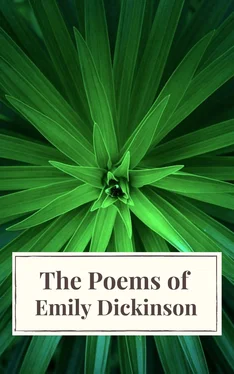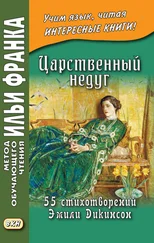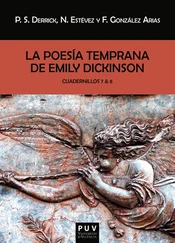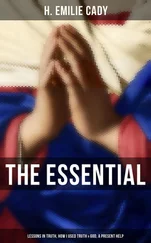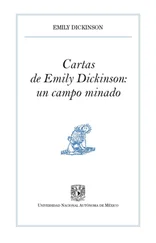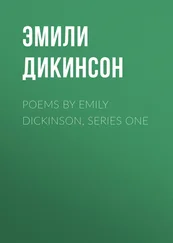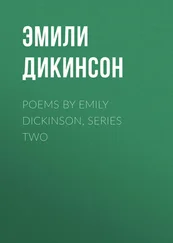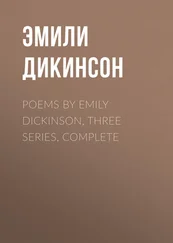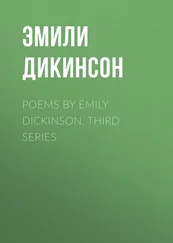She doth not wait for June;
Before the world is green
Her sturdy little countenance
Against the wind is seen,
Contending with the grass,
Near kinsman to herself,
For privilege of sod and sun,
Sweet litigants for life.
And when the hills are full,
And newer fashions blow,
Doth not retract a single spice
For pang of jealousy.
Her public is the noon,
Her providence the sun,
Her progress by the bee proclaimed
In sovereign, swerveless tune.
The bravest of the host,
Surrendering the last,
Nor even of defeat aware
When cancelled by the frost.
XV.
THE BEE.
Like trains of cars on tracks of plush
I hear the level bee:
A jar across the flowers goes,
Their velvet masonry
Withstands until the sweet assault
Their chivalry consumes,
While he, victorious, tilts away
To vanquish other blooms.
His feet are shod with gauze,
His helmet is of gold;
His breast, a single onyx
With chrysoprase, inlaid.
His labor is a chant,
His idleness a tune;
Oh, for a bee's experience
Of clovers and of noon!
XVI.
Presentiment is that long shadow on the lawn
Indicative that suns go down;
The notice to the startled grass
That darkness is about to pass.
XVII.
As children bid the guest good-night,
And then reluctant turn,
My flowers raise their pretty lips,
Then put their nightgowns on.
As children caper when they wake,
Merry that it is morn,
My flowers from a hundred cribs
Will peep, and prance again.
XVIII.
Angels in the early morning
May be seen the dews among,
Stooping, plucking, smiling, flying:
Do the buds to them belong?
Angels when the sun is hottest
May be seen the sands among,
Stooping, plucking, sighing, flying;
Parched the flowers they bear along.
XIX.
So bashful when I spied her,
So pretty, so ashamed!
So hidden in her leaflets,
Lest anybody find;
So breathless till I passed her,
So helpless when I turned
And bore her, struggling, blushing,
Her simple haunts beyond!
For whom I robbed the dingle,
For whom betrayed the dell,
Many will doubtless ask me,
But I shall never tell!
XX.
TWO WORLDS.
It makes no difference abroad,
The seasons fit the same,
The mornings blossom into noons,
And split their pods of flame.
Wild-flowers kindle in the woods,
The brooks brag all the day;
No blackbird bates his jargoning
For passing Calvary.
Auto-da-fe and judgment
Are nothing to the bee;
His separation from his rose
To him seems misery.
XXI.
THE MOUNTAIN.
The mountain sat upon the plain
In his eternal chair,
His observation omnifold,
His inquest everywhere.
The seasons prayed around his knees,
Like children round a sire:
Grandfather of the days is he,
Of dawn the ancestor.
XXII.
A DAY.
I'll tell you how the sun rose, —
A ribbon at a time.
The steeples swam in amethyst,
The news like squirrels ran.
The hills untied their bonnets,
The bobolinks begun.
Then I said softly to myself,
"That must have been the sun!"
* * *
But how he set, I know not.
There seemed a purple stile
Which little yellow boys and girls
Were climbing all the while
Till when they reached the other side,
A dominie in gray
Put gently up the evening bars,
And led the flock away.
XXIII.
The butterfly's assumption-gown,
In chrysoprase apartments hung,
This afternoon put on.
How condescending to descend,
And be of buttercups the friend
In a New England town!
XXIV.
THE WIND.
Of all the sounds despatched abroad,
There's not a charge to me
Like that old measure in the boughs,
That phraseless melody
The wind does, working like a hand
Whose fingers brush the sky,
Then quiver down, with tufts of tune
Permitted gods and me.
When winds go round and round in bands,
And thrum upon the door,
And birds take places overhead,
To bear them orchestra,
I crave him grace, of summer boughs,
If such an outcast be,
He never heard that fleshless chant
Rise solemn in the tree,
As if some caravan of sound
On deserts, in the sky,
Had broken rank,
Then knit, and passed
In seamless company.
XXV.
DEATH AND LIFE.
Apparently with no surprise
To any happy flower,
The frost beheads it at its play
In accidental power.
The blond assassin passes on,
The sun proceeds unmoved
To measure off another day
For an approving God.
XXVI.
'T was later when the summer went
Than when the cricket came,
And yet we knew that gentle clock
Meant nought but going home.
'T was sooner when the cricket went
Than when the winter came,
Yet that pathetic pendulum
Keeps esoteric time.
XXVII.
INDIAN SUMMER.
These are the days when birds come back,
A very few, a bird or two,
To take a backward look.
These are the days when skies put on
The old, old sophistries of June, —
A blue and gold mistake.
Oh, fraud that cannot cheat the bee,
Almost thy plausibility
Induces my belief,
Till ranks of seeds their witness bear,
And softly through the altered air
Hurries a timid leaf!
Oh, sacrament of summer days,
Oh, last communion in the haze,
Permit a child to join,
Thy sacred emblems to partake,
Thy consecrated bread to break,
Taste thine immortal wine!
XXVIII.
AUTUMN.
The morns are meeker than they were,
The nuts are getting brown;
The berry's cheek is plumper,
The rose is out of town.
The maple wears a gayer scarf,
The field a scarlet gown.
Lest I should be old-fashioned,
I'll put a trinket on.
XXIX.
BECLOUDED.
The sky is low, the clouds are mean,
A travelling flake of snow
Across a barn or through a rut
Debates if it will go.
A narrow wind complains all day
How some one treated him;
Nature, like us, is sometimes caught
Without her diadem.
XXX.
THE HEMLOCK.
I think the hemlock likes to stand
Upon a marge of snow;
It suits his own austerity,
And satisfies an awe
That men must slake in wilderness,
Or in the desert cloy, —
An instinct for the hoar, the bald,
Lapland's necessity.
The hemlock's nature thrives on cold;
The gnash of northern winds
Is sweetest nutriment to him,
His best Norwegian wines.
To satin races he is nought;
But children on the Don
Beneath his tabernacles play,
And Dnieper wrestlers run.
XXXI.
There's a certain slant of light,
On winter afternoons,
That oppresses, like the weight
Of cathedral tunes.
Heavenly hurt it gives us;
We can find no scar,
But internal difference
Where the meanings are.
None may teach it anything,
' T is the seal, despair, —
An imperial affliction
Sent us of the air.
When it comes, the landscape listens,
Shadows hold their breath;
When it goes, 't is like the distance
On the look of death.
Конец ознакомительного фрагмента.
Текст предоставлен ООО «ЛитРес».
Прочитайте эту книгу целиком, купив полную легальную версию на ЛитРес.
Читать дальше
